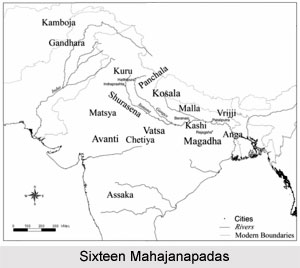 India`s earliest empire was evolving around the Gangetic plains, which included the Mahajanapadas. Anga was one of these evolving states, which is one of the sixteen Mahajanapadas that prospered during that period. Malini, Champapuri, champa Malini, Kala Malini etc were the different names by which this sate was called. The Angas were first referred to in the Atharva Veda as the detested people. Atharva Veda considers Anga an unholy place and some even condemned it as a place where wives and children were sold. Mahabharata, testifies the people of Anga to be of noble birth or `Sujati` proclaiming the sanctity of the place Champa as a pilgrimage. During the reign of Bimbisara this Mahajanapada was usurped and taken over by Magadha. Champa was also a major seat for the spread of Jainism and Buddhism and is its capital. This was situated on the river champa, which flowed in between Anga and Magadha.
India`s earliest empire was evolving around the Gangetic plains, which included the Mahajanapadas. Anga was one of these evolving states, which is one of the sixteen Mahajanapadas that prospered during that period. Malini, Champapuri, champa Malini, Kala Malini etc were the different names by which this sate was called. The Angas were first referred to in the Atharva Veda as the detested people. Atharva Veda considers Anga an unholy place and some even condemned it as a place where wives and children were sold. Mahabharata, testifies the people of Anga to be of noble birth or `Sujati` proclaiming the sanctity of the place Champa as a pilgrimage. During the reign of Bimbisara this Mahajanapada was usurped and taken over by Magadha. Champa was also a major seat for the spread of Jainism and Buddhism and is its capital. This was situated on the river champa, which flowed in between Anga and Magadha.



















